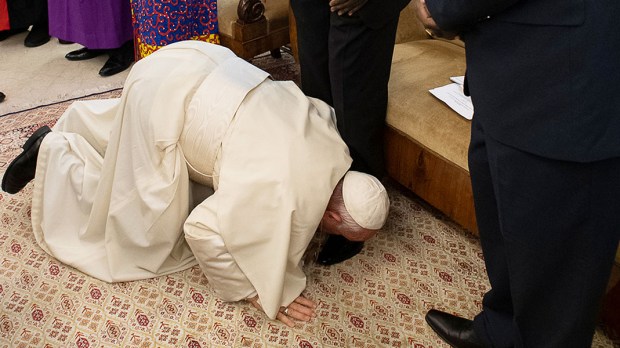Every day, Aleteia offers a selection of articles written by the international press about the Church and the major issues that concern Catholics around the world. The opinions and views expressed in these articles are not those of the editors.
Wednesday 9 February 2022
1 – Archbishop Welby: Pope Francis may visit South Sudan “in the next few months”
2 – Synod: Pope hit the reset button, says a Dutch theologian
3 – Vatican ambassador to India insists caste plays no role in bishop selection
4 – Laity fear voices will not by heard in synodal process
5 – From a helicopter, Colombian bishop blesses violent city
According to Archbishop Welby of Canterbury, Pope Francis may visit South Sudan “in the next few months.”
Referring to the South Sudanese leaders, the Anglican Archbishop of Canterbury, Justin Welby, said that if “God willing, sometime in the next few months, perhaps year, we will go and see them in Juba, not in Rome, and see what progress can be made.” In 2017, Pope Francis’ planned trip to South Sudan was postponed due to the country’s deteriorating security situation. Then, in 2019, the Pontiff welcomed a delegation of five South Sudanese leaders to Rome for a retreat. He then kissed their feet, urging them not to plunge the country back into civil war. The Vatican’s number three, Archbishop Paul Gallagher, also visited Juba in December 2021 to meet with the country’s political leaders.
Agenzia Nova, Italian
For Dutch theologian Myriam Wijlens, Pope Francis has given a “fresh start” to a more than 100-year-old theological question by initiating the Synod on synodality. Since the First Vatican Council, she explains, the place of the “People of God” has become a central issue, as the pontifical role has been redefined. “It’s not just a matter of thinking about structures,” the Synod advisor argues, but of nourishing the dialogue of the Church’s members with the Word of God. It is not a matter of establishing an ecclesial parliamentarianism, she insists – though encouraging voting on issues – but of determining together in whose name the priest, the bishop and the pope are speaking. This, she insists, can only be done by reaching a “consensus,” a process that requires patience in the first place.
Katholisch.de, German
Vatican ambassador to India insists caste plays no role in bishop selection
In a statement sent to Crux the Apostolic Nunciature in India wanted to clarify that “there is no discrimination in the selection of episcopal candidates and in the appointment of new Bishops” with regards to “ethnicity, caste, language or social status.” The Nunciature felt the need to reaffirm their strong condemnation of the caste system, still largely in place in some segments of Indian society, after the Apostolic Nuncio to India, the Italian Archbishop Leopoldo Girelli, met with the Dalit Christian Liberation Movement (DCLM) on February 2. The Dalits, often called the “untouchables,” are the lowest level of the Hindu caste system. This DCLM was criticizing the fact that in the areas of Tamil Nadu and Pondicherry, where 70% of Catholics are Dalit, there is only one Dalit bishop in 18 dioceses.
Crux, English.
Laity fear voices will not be heard in synodal process
According to a first assessment of the synodal process released by the Synod of Bishops after a meeting of the ordinary council, nearly 98% of the world’s bishops’ conferences have appointed a person or team to implement the synodal process begun last October. Europe has already made 79 contributions, while there are 26 from North America, some 40 from Asia and 18 from Latin America. Among the concerns expressed in the report are: the “reluctance” of some Catholic priests, the mistrust of the laity who doubt that their contribution will be truly taken into account, the difficulties of communicating in the context of the pandemic, and the difficulty of maintaining an “authentically” spiritual process, rather than a parliamentary debate. The Synod organizers also recognize that the synodal process will extend well beyond 2023.
The Tablet, English.
From a helicopter, Colombian bishop blesses violent city
On Friday afternoon, February 4, 2022, during a helicopter flight of about an hour and a half, Bishop Rubén Darío Jaramillo blessed the city of Buenaventura and its port. The prelate sprinkled holy water over the places he passed and made the Sign of the Cross with a crucifix. This surprising blessing comes shortly after hundreds of indigenous families were driven from their homes by criminal gangs. These armed groups are fighting over territory where they engage in smuggling activities, further increasing the number and intensity of violence. In a video shared by the diocese, Bishop Jaramillo said he blessed “the city, the rivers, the lakes, the people” so that “God will come to enlighten and help these people who use violence” and that the indigenous families “can return to where they have always lived.”
Acidigital, Portuguese

